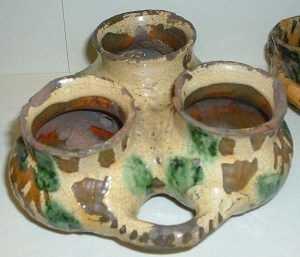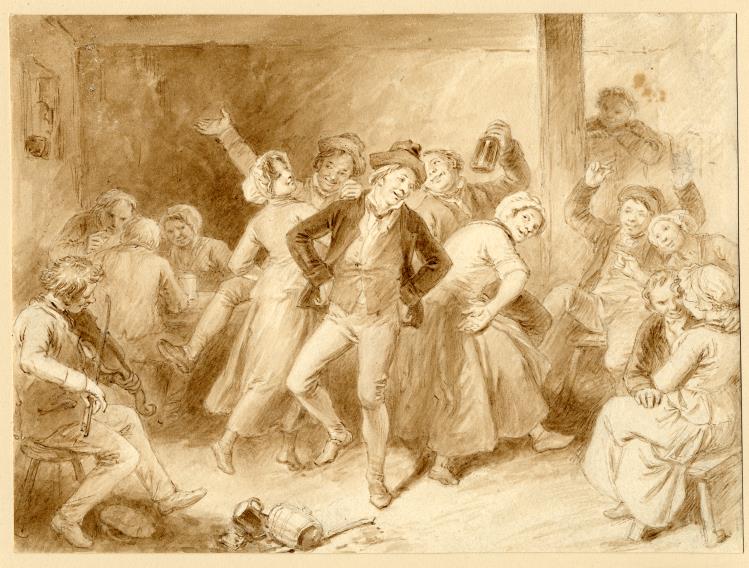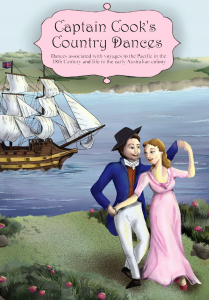◄ Previous page Back to main page Next page ►
BAKER, Dinah
Dancing in tavern, 1840 Hobart
Ann Dixon and Dinah Baker, two ticket-of-leave ladies, were charged by Constable Adams with dancing in Mr. Walton’s tavern last evening; fourteen days in a cell on bread and water.
Domestic Intelligence. (1840, 24 April 1840). Australasian Chronicle (Sydney, NSW : 1839 – 1843), p. 2. Retrieved from http://nla.gov.au/nla.news-article31728125
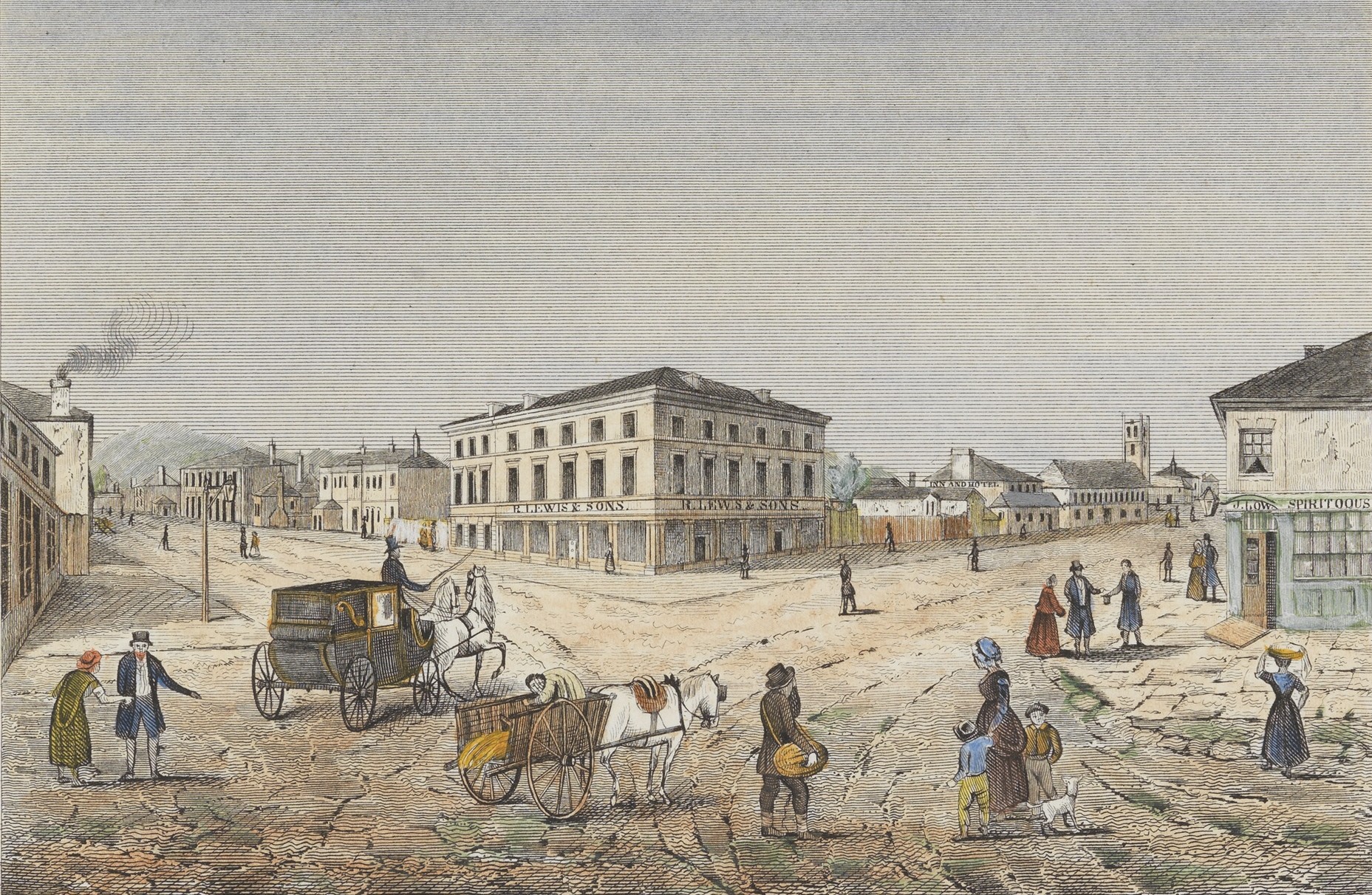
Hobart Town in 1840 E. Buchner. With permission from Allport Library and Museum of Fine Arts, Tasmanian Archive and Heritage Office.
BALL, William
Dancing seraband to mouth organ, 1833 Sydney
THURSDAY.-William Ball, William Horden, and Arthur Parr, three of the Sydney swell mob, . were placed at the bar, to clear themselves of the charge of vagabondism, which was made against them, they having been picked up in the street late overnight, dancing a seraband to music pulled out of a mouth organ. It appeared, that the prisoners were part of a gang of eight, who pig together in a wretched hovel, behind the market-place, from which they make nightly sorties on expeditions, that may be guessed at. There being no positive proof of any offence against them, anti they stoutly maintaining they were engaged on board ship, the Bench discharged them, with an order to the charleys to keep a bright eye upon them.
POLICE INCIDENTS. (1833, June 10). The Sydney Herald (NSW : 1831 – 1842), p. 2 (Supplement to the Sydney Herald.). Retrieved October 17, 2016, from http://nla.gov.au/nla.news-article12846998
BIGGS, William
Glee singing and dancing round constable
Thomas Coust, Thomas Hackett, and Willam Biggs, a trio of the most amiable description, were charged with glee singing in George-street.
” A boat a boat and to the ferry, For we’ll go over to be merry,
To laugh and quiff and drink old sherry.”
A constable amazed at this course of proceeding, stepped up and wished to know what they were at, when they joined hands and danced in a circle round him; irritated at this, he surrounded them, as Pal would say, and conveyed them to the lock-up ; they now looked in each other’s face with amazement and appeared astonished at their vagaries. The usual question touching the pecuniary having been put and answered in the negative with a melancholy shake of the, they to the Stocks took their lonely way, there to repose and enjoy the healthful breezes and glorious sunshine for one hour each.

“A boat! A boat!”
A popular 19th century broadside ballad. J. Catnach Printer, Monmouth Court, 7 Dials (London) Courtesy of Broadside Ballads Online
POLICE INCIDENTS. (1837, April 11). The Sydney Gazette and New South Wales Advertiser (NSW : 1803 – 1842), p. 3. Retrieved January 30, 2017, from http://nla.gov.au/nla.news-article2210369
BOYLE, Catharine
Fuddling, fiddling, dancing and capering. 1827 Sydney
Wednesday.—Thos. Fellowes, prisoner, Catharine Boyle, free, and a ticket-of-leave man, whose name bears some affinity to leeks or garlick, were found by that gallant champion of the baton, Fitzpatrick, in what he said was a disorderly house; and it appeared also that the parties had been therein fuddling, fiddling, and dancing at the hour of 12 last night.
Kitty’s eloquent chops, in answer to some questions put by the Bench, were instantly in motion. She stated that her owld man was ill at home, and had been so for a considerable time back ; that she had just come down the country with another man (heaven forbid that we should report him to be a fancy man, although there were some significant looks in the Court) and that she went in pursuit of Ned Tutty, and landed in the aforesaid house quite without her knowledge at all at all.
Mr. Hely advised Kate to go home and attend to her sick husband, sentenced the Sydney Orpheus who kept the people capering at their midnight orgies to 5 days solitary confinement on bread and water, and Fellowes to the treadmill.
Police Reports. (1827, February 24). The Sydney Gazette and New South Wales Advertiser (NSW : 1803 – 1842), , p. 3. Retrieved August 10, 2016, from http://nla.gov.au/nla.news-article2187733
Read more about the art of Fuddling, and the connection of magistrate Hely to the music life of Sydney.
BRADSHAW, Thomas
No dancing in the house that night
There was no dancing, nor yet any music in the house that night, it was quiet place.
[Recorded as a comment on the unusual nature of the quiet house]
Police Report. (1827, May 23). The Sydney Gazette and New South Wales Advertiser (NSW : 1803 – 1842), p. 3. Retrieved January 30, 2017, from http://nla.gov.au/nla.news-article2188271
BROWN, Mrs
Upper floors of the house were fitted up with a ball room for midnight revels
Disorderly Houses. — David Walsh, joint-proprietor with a Mrs Brown in an apparent eating house, in Castlereagh-street, at which some of the most profligate of both sexes have for about two years past held their midnight revels, was convicted before the Court of Quarter Sessions on Monday last, and sentenced to be, worked on the treadmill, at Carter’s Barracks, for six months. The conviction was effected through the instrumentality of Police Sergeant Price, through whose active exertions the defendant and Mrs Brown had been previously convicted within the same period on no less than three distinct in-formations for sly-grog selling. The two upper floors of the house were fitted up with a ball room, private supper room, and bed rooms, all elegantly furnished, but unoccupied by any of the family, so as to leave no doubt as to the uses, or rather abuses to which they were put. The house has long borne a most notorious character, and the ruin of many a promising youth, of respectable connections, has been effected within its unhallowed walls. Much praise is due to the Police for having, after many unsuccessful attempt, succeeded in putting down this intolerable nuisance.
SUPREME COURT—(CIVIL SIDE) (1840, July 9). The Australian (Sydney, NSW : 1824 – 1848), p. 2. Retrieved December 17, 2018, from http://nla.gov.au/nla.news-article36849371
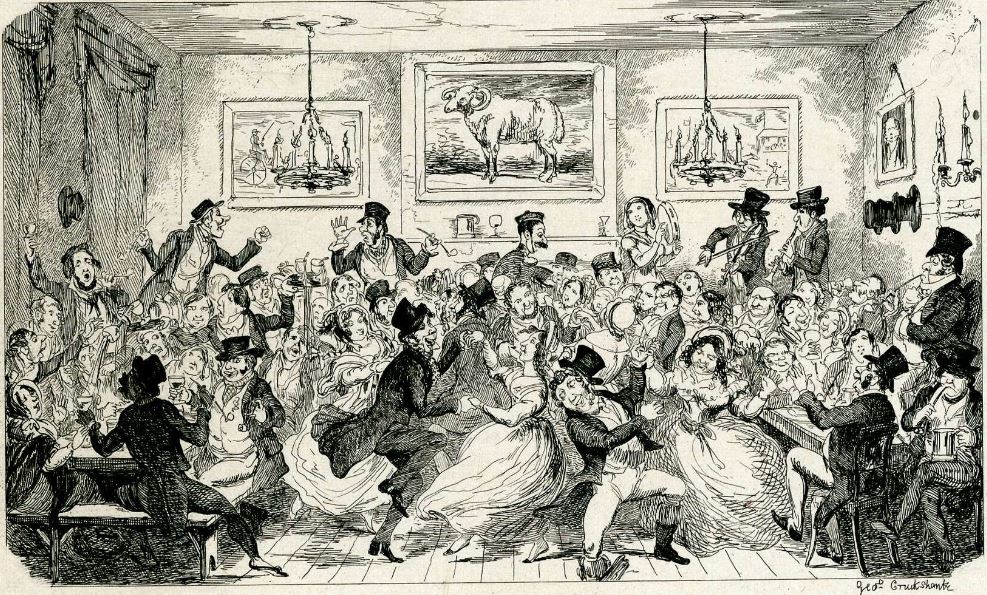
A public ball. George Cruikshank (1846) London © The Trustees of the British Museum.
BUCKLEY, James
Fiddling and dancing, on the night of Good Friday
James Buckley appeared by summons to answer the complaint of constable Brown, for fiddling and dancing, on the night of Good Friday. Reprimanded and discharged.
Police Reports. (1827, April 25). The Sydney Gazette and New South Wales Advertiser (NSW : 1803 – 1842), p. 3. Retrieved January 30, 2017, from http://nla.gov.au/nla.news-article2188106
BULL, Thomas
Found one of the prisoners dancing, 1833 Sydney
Thomas Bull, a house keeper, residing in Cambridge-street, was brought up by summons, on a charge of harbouring two runaway prisoners, as-signed to J. Palmer, Esq., of Parramatta. Benjamin Ford, a constable, deposed, that passing the defendant’s house, on the 22nd of February, he heard music and dancing about 2 o’clock in the morning, he went in, and found one of the prisoners dancing, and the other sitting down ; suspecting from their appearance they were runaways, he apprehended them. The defence set up was, that the defendant was merely a lodger in the house, the house being kept by a female named Rosanna White, who alone was responsible. It was, however, proved by the landlord of the house that the defendant had paid the rent, and had always acted as the master. The Bench found him guilty of the offence, and awarded that be should pay a fine to the King of 100 Spanish dollars, and costs, in three days, in default of which to be confined in gaol until the same be paid.
Police Report. (1833, March 5). The Sydney Gazette and New South Wales Advertiser (NSW : 1803 – 1842), p. 3. Retrieved January 13, 2017, from http://nla.gov.au/nla.news-article2211011
BURN, Sarah
Dancing a reel, 1835 Hobart
Monday, 2 November
Sarah Burn was charged with having helped herself to a bottle too much. She had been entrusted in her master’s cellar to get some wine; shortly after she was found dancing a reel in the kitchen, her merry mood led to an enquiry and search, and in her bed room was found two bottles of her master’s wine. The discovery altered her step, and she was danced to durance vile until Saturday.
“Durance vile” is an archaic term for imprisonment or confinement.
Hobart Town Police Report. (1835, 10 November 1835). Colonial Times (Hobart, Tas. : 1828 – 1857), p. 8. Retrieved from http://nla.gov.au/nla.news-article8648691
BURNS, Francis
Dancing and singing
Police Incidents. Francis Burns, a gentleman possessing a very pretty thin metallic voice, something like a teakettle, if it could find a voice, was charged with dancing and singing in George Street on Sunday for which he was taken into custody.
Colonel: What have you got to say?
Francis: Say ! why, there was no music.
Colonel: I should have wondered if there was?; have you got anything further to urge ?
Francis: I was only dancing to please myself.
Colonel: No doubt. You will now sit six hours in the stocks to please me, and find bail to keep the peace.
Francis having elevated the eyebrows of surprise, grunted and walked from the bar.
Police Incidents. (1838, July 2). The Sydney Monitor (NSW : 1828 – 1838), p. 2 (MORNING). Retrieved December 16, 2018, from http://nla.gov.au/nla.news-article32160551
BYRNE, Jeremiah
Musician for two-penny hops
Jeremiah Byrne, an itinerant, who is in the habit of spliting the ears of the groundlings at the two-penny hop shops on the rocks, was placed at the bar, having been taken out of one of those public nuisances at a very late hour of the night. A man named Brown to whom he is assigned, denied that he had his permission to be absent from home, and the Bench accordingly called upon him to know what he had to say for himself,
” Why may it it please your Worship” said, Jeremiah Byrne, “I’m a musicianer, and I plays on the flageolet, I can play, ‘Bobbing Joan’, ‘Darby Kelly’, ‘Paddy Ward’s pig,’ or ‘Judy Callaghan’ with any musicianer in the country;” and thereupon Jeremiah Byrne placed his flageolet to his mouth, and struck up a tune that had well nigh inflicted the Cholera Morbus on all present.
“Do you call that playing?” exclaimed the constable at his elbow, snatching the instrument, ” I’ll show you how to play you imposter. What will your Honor please to have?” His Honor however, being perfectly satisfied with the piper’s specimen, declined hearing the indignant constable’s variations, and ordered Jeremiah Byrne, as he must be pretty well tired of piping, to dance for the next seven days.
Police Report. (1832, December 6). The Sydney Gazette and New South Wales Advertiser (NSW : 1803 – 1842), p. 3. Retrieved January 30, 2017, from http://nla.gov.au/nla.news-article2209764

